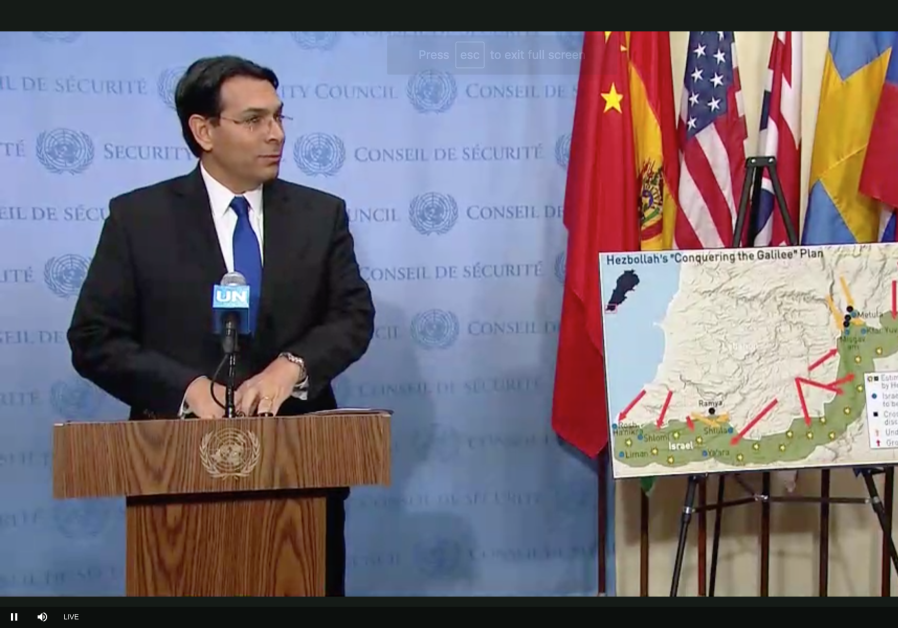“Why isn’t there a coordinated orchestra with the IDF contributing rather than leading the effort?”
Editorial, The Jerusalem Post,December 22

Image from article: Danny Danon [see] with a map of Hezbollah tunnels in front of the UN Security Council, December 19th, 2018. (photo credit: screenshot)
Last week, ahead of a UN Security Council debate on the Hezbollah attack tunnels Israel has discovered along the northern border, the IDF launched a media campaign and public diplomacy [JB emphasis] blitz to shake up the world.
CNN was given an exclusive story. Its reporter was brought to one of the tunnels and allowed to drop a camera inside to take never-seen-before footage. One of the officers in the IDF Spokesperson’s Office put out a video in English calling on Lebanon to take action to reign in Hezbollah and prevent another war.
It was a nice attempt but ultimately it did not succeed.
The Security Council met on Wednesday and failed to issue an unequivocal condemnation of Hezbollah or Lebanon. As expected, Israel remains alone.
The question is whether the outcome could have been different and whether a more strategic campaign would have forced the world to step up to the plate and take responsibility for the continued violations by Hezbollah.
It is difficult to know, but a few flaws were recognizable in Israel’s handling of the media campaign ahead of the UNSC debate.
The first was making the IDF the main actor. The military is not a replacement for the government or the state. It plays an important role in defending the country and neutralizing enemy threats, but it should not be the primary spokesperson when trying to convey a diplomatic message. For that, there is supposed to be the Foreign Ministry, the Prime Minister’s Office or an assortment of other governmental roles in different systems.
“Why isn’t there a coordinated orchestra with the IDF contributing rather than leading the effort,” asked Lt.- Col. (res.) Peter Lerner, a former head of the IDF’s international media desk, in Friday’s Jerusalem Post.
The answer is sadly that Israel today does not have a strong foreign service. It has been eviscerated by Prime Minister Benjamin Netanyahu, who in addition to his full time duties as the country’s leader, also serves as defense minister, foreign minister, health minister and immigration and absorption minister.
The deterioration of the foreign service didn’t start recently. It has been a long process, mostly since Netanyahu returned to the premiership in 2009. At the time, he appointed Avigdor Liberman as foreign minister but barred him from working with the US or Europe, leaving him focused on Africa and Asia. Important continents but not the catalyst of international public opinion.
For the last four years, Netanyahu has served as foreign minister and just ask diplomats what is going on. They will tell you how budgets have disappeared and how they are left out of key discussions on issues that are meant to reside within their wheelhouse.
While the CNN exclusive was a nice effort, it could be that if IDF Spokesperson Ronen Manelis had consulted with the Foreign Ministry they would have recommended he bring a French TV crew, a Chinese one, a Russian one and a British one, all from countries that are permanent members of the Security Council. CNN is nice but they’re not watching it around the clock in Beijing or at the Kremlin. To help mold public opinion, you have to think beyond the quick exclusive.
But then again, Manelis cannot be blamed. He’s an IDF officer with a clear mission – to represent the military before the media. A country needs something greater, a coordinated effort that brings all of its resources to bear on an issue when needed.
Such a coordinator was supposed to be established in 2006 after the Second Lebanon War. The role was created and it sits in the Prime Minister’s Office but with limited influence and almost zero real authority.
Can this change? Under the current government system, it is hard to believe. Every minister says what they want on any topic that they want without any guidance, discipline or instruction. In a place where the transportation minister talks about Iran and the education minister talks about how Israel should fight Hezbollah – understandable when they are all politicians vying for power – how can we really expect a coordinated and disciplined effort? Nevertheless, and considering the challenges Israel is facing, the government needs to try.
It’s time to understand the power of public diplomacy.
The appointment of a full time foreign minister would be a first step in the right direction.
No comments:
Post a Comment